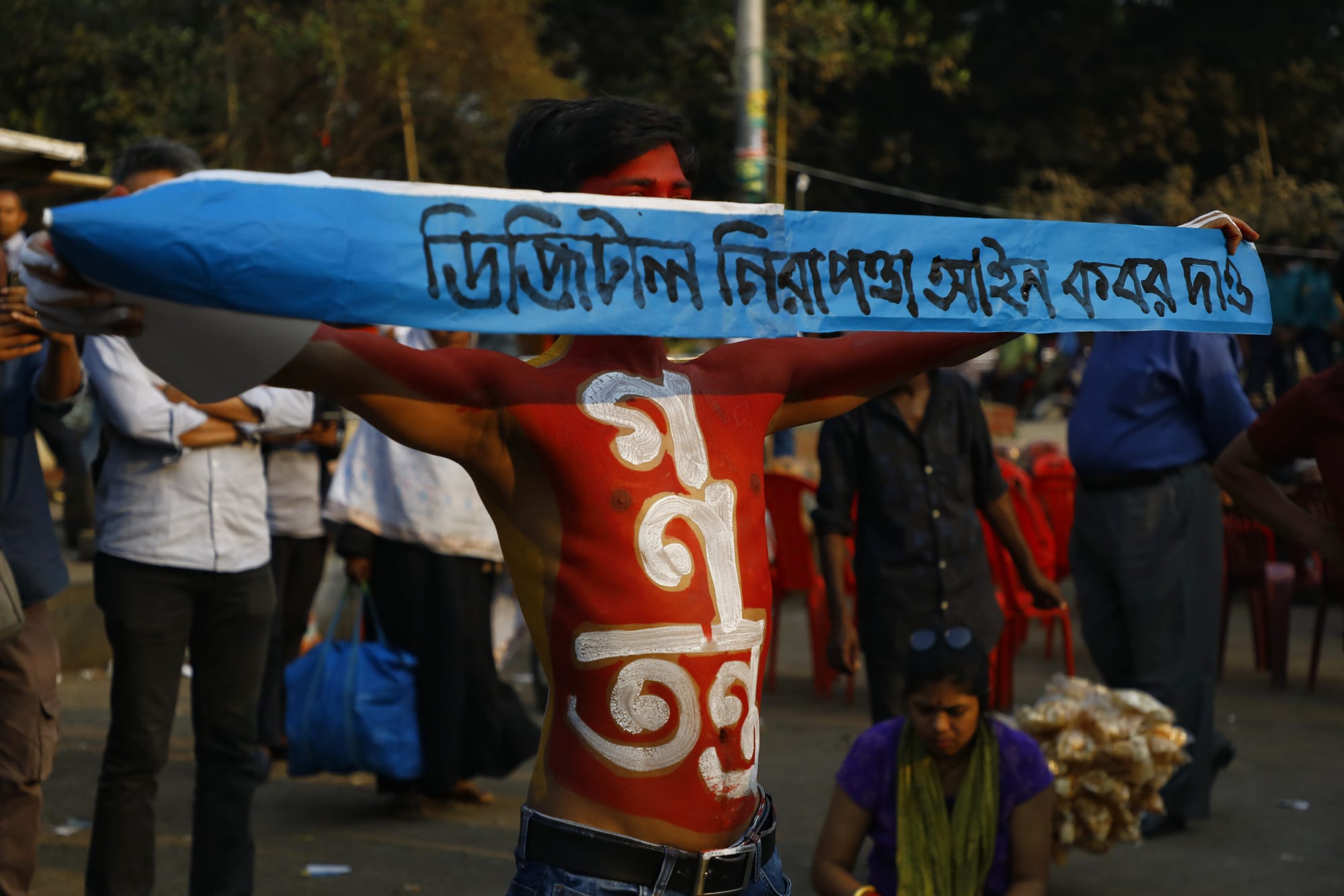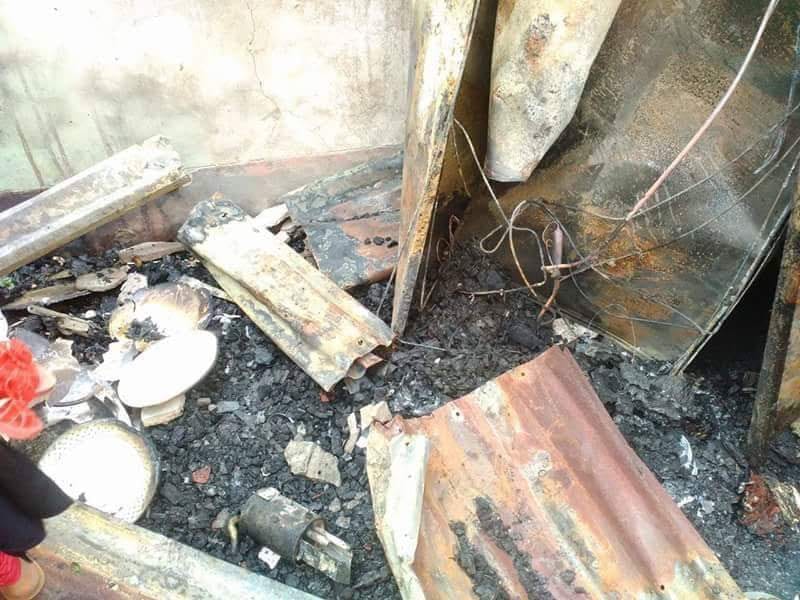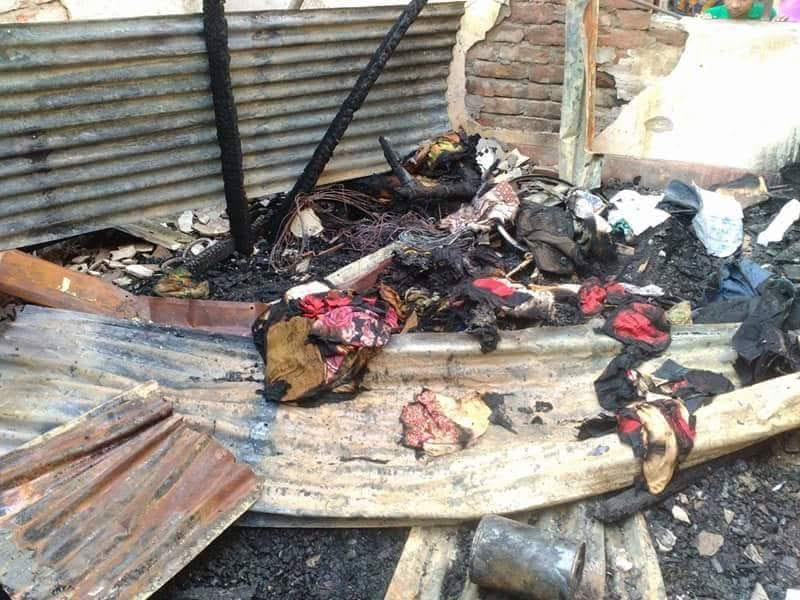DSA repealed, but victims stayed in limbo
After the interim government took office last year, cases under controversial laws like the Digital Security Act (DSA) were reportedly annulled. However, despite an official announcement in May 2025, victims continued facing lengthy legal battles until recently.

There was a knock on the door past 10 pm. Saidul got up from the dinner table. Walking to the door, he thought about work logistics for the following day. Saidul owned a small car dealership business. But that had to wait.
“The police showed me a photo and asked if it was me,” Saidul recounted. “It was. And then they said, ‘I have to go with them’. My parents were asleep. I had to scream to wake them.” He remembers the policemen lining the streets when he stepped out of his home.
On September 7th 2021, Saidul Haque, 22, was arrested and taken to the police station in Feni Sadar. On the following day, he was sent to jail charged under the Digital Security Act (DSA), enacted in 2018, for a Facebook comment on a post shared by the Bangladesh police. Saidul suggested moral education for the law enforcement agency and that most of the country’s police are corrupt.
Saidul’s arrest is among hundreds of similar cases filed under the controversial DSA’s provisions, which criminalise social media content deemed to taint the reputation of the incumbent government, its institutions, leaders, or its founding figures.
Fast forward to a “new Bangladesh” after the July uprising in 2024.
On May 6th 2025 at a press conference, the interim government’s Law Adviser Asif Nazrul announced that nine sections of the Cyber Security Act (CSA) — enacted in 2023 as a pseudo-updated version of the DSA — would be repealed under the new Cyber Security Ordinance (CSO). This would lead to the automatic dismissal of ongoing cases lodged under the previous versions of the Ordinance.
However, Netra News’s findings showed a different reality. A multimedia report on lingering DSA cases published by Netra News on October 2nd 2025 sheds light on several individuals who were exhausted and trapped in protracted legal battles despite the interim government’s assurance of case annulments.
It was not until October 9th that the interim government introduced an amendment to the Cyber Security Ordinance 2025 granting immediate reprieve to those accused or convicted under certain sections of the now defunct Digital Security Act (DSA).
Months of delay, protracted suffering
“I returned to the country from Dubai this year believing that all cases under speech offenses, digital security, and cyber security had been withdrawn. But on my return, I realised that was not the case,” said Ahmed Sabbir, a victim of a case under the DSA.
Sabbir was arrested on April 17th 2020 under sections 21(2) and 31(2) of the DSA at the Digital Cyber Tribunal in Rajshahi. The arrest came after he posted a quote from the autobiography of Sheikh Mujibur Rahman meant to reflect on the contemporary political situation of the then-ruling Awami League. In the same post, he referenced the slogan “Joy Bangla, Joy Bangabandhu” but altered it slightly to “Joy Bunga Bunga.”
There was more. Sabbir said he had a prior business relationship with the district police, supplying gift items and managing small projects. In 2019, a dispute with the then-Bogura Deputy Police Superintendent Kudrat-E-Khuda over an unpaid bill led to harassment and alleged mistreatment, according to local newspaper reports. During the Covid-19 period, Sabbir moved to his village in Rajshahi to run a poultry farm but the officer continued tracking him.
Sabbir spent seven months in jail before he secured bail. In 2022, he left the country.
Ahshan Habib, a victim of a DSA case, reiterated. “When Dr. Yunus took office as the Chief Advisor of the interim government, a few days later in his addresses to the nation, he clearly stated that the provisions that had curtailed people’s freedom of speech would be repealed. However, when I went to appear in court, my lawyer told me: No, your case has not been withdrawn.”
Habib was arrested on March 19th 2021 under DSA for a social media post commenting on the 2018–19 detention of Baul musicians, followers of Lalon, amid debates over whether music is permissible in Islam. “I made a post saying that if music is forbidden in Islam, then female leadership is also forbidden. By that logic, our Prime Minister Sheikh Hasina should resign.”
This was misconstrued as a call for the prime minister’s resignation. Habib was first held in custody at Khagrachhari Sadar police station. He had to pay Tk120,000 in cash directly to the judge in addition to about Tk10,000 for legal fees to secure his bail in 2021 after two months in jail.
In a similar case, Gazi Habibullah Manik, district joint convener of the BNP was arrested in April 2021, he claimed, simply for liking a social media post critical of the then-government. Manik believes that beyond his alleged political affiliation, his outspoken criticism on social media, particularly about the DSA, made him a target.
Abul Bashar, another victim, was charged with a case under Section 57(2) of the ICT Act 2006 on March 17th 2017. Bashar claimed he was targeted by a few people in his area who distributed content under his name via fake social media accounts in madrasas and mosques hurting religious sentiment. “On the 15th and 16th, my home was attacked, vandalised, set on fire, and my business looted. On March 17th, the police became the complainant and filed the case,” he recounted.


In mid-March 2017, Abul Bashar's house fell prey to looters and vandals following a case filed under Section 57(2) of the ICT Act 2006, accusing Bashar of spreading posts hurting religious sentiments. Photographs: Abul Bashar
Following Netra News’ multimedia report, Zahidur Rahman Tarek, a Jhenaidah resident, contacted Netra News. “In 2022, I spent almost an entire year in Jhenaidah District Jail because of a case filed against me under the DSA,” he said. The case, he explained, originated from his comments — such as Sakib Khan might become the father of the nation — on news posts and a Facebook post, with the complaint initially lodged by a former chattra league leader, claimed Tarek.
The case later moved to the Khulna Cyber Security Act Court, where he faced charges under Section 21 for allegedly posting content insulting Sheikh Mujibur Rahman. “Each court appearance from Jhenaidah to Khulna costs around Tk8,000, and securing bail alone cost me nearly Tk11 lakh,” Tarek said.
He obtained bail from the High Court almost 11 months after his arrest, but the financial and emotional consequences linger. “After my release, it became nearly impossible to manage my medical expenses, my wife’s illness, unemployment, and my children’s education. Spending almost a year in jail left my family devastated.” Tarek’s next hearing was scheduled for November 3rd 2025 at Khulna Cyber Crime Tribunal.
While Netra News spoke to at least six individuals with pending cases, attempts to find the updated figures for cases under the ICT Act, DSA, and CSA after May 2025 were unsuccessful. Neither the police, the Secretariat nor the Law Adviser provided the current data; and applications filed in August 2025 under the Right to Information Act yielded no response.
According to documents Netra News obtained under the Right to Information, a total of 1,374 cases were filed under Section 57 of the Information and Communication Technology (ICT) Act of 2006 from 2006 to 2018 at police stations nationwide.
On June 5th 2023, the then-Law Minister Anisul Haq told parliament that a total of 7,001 cases had been filed under the Digital Security Act between October 8th 2018, and January 31st 2023. A study published by the Centre for Governance Studies (CGS) on April 30th 2024 found that 4,520 individuals were named as accused in cases under the Digital Security Act over five years.
On August 25th 2025, Law Adviser Asif Nazrul told Netra News in an interview, “We have annulled all cases under the 2023 Cyber Security Act, but the 2018 cases were not explicitly included. I am referring to speech offense cases. While the repeal of 2023 cases implied that 2018 cases could also be addressed by judges, we did not clearly state this. Perhaps due to this lack of clarity, these older cases are not being withdrawn.”
Abul Bashar said he submitted appeals for the withdrawal of the ICT case against him to the Chief Adviser on May 4th and then to the Home Adviser on June 17th but to no avail. When Bashar’s case was pointed out to the Law Adviser, he further added that provisions related to speech offenses under the ICT Act would also be annulled along with cases under the DSA. However, the October 9th announcement from the interim government does not mention cases filed under the ICT Act.
Notwithstanding, Supreme Court lawyer Abdullah Al Noman explained to Netra News in August that the law does not provide for automatic dismissal of cases. “There is no provision for cases to be nullified automatically, and legally it would not be correct to describe it that way. Typically, when such draconian laws are challenged, there are specific procedures.”
One way is through judicial review, where a court can declare a law null and void. According to Supreme Court guidelines, the court can then nullify all related cases. Alternatively, the executive branch, guided by the Supreme Court, manages criminal cases where the state is the default complainant. Prosecutors compile a list of cases, sometimes in consultation with victims, and the executive issues a notification withdrawing those cases, according to Noman. “This is the proper procedure; there is no scope under the law for automatic dismissal.”
Scope for compensation?
Not just legal fees, but the six victims’ turmoil caused by the five DSA cases and one ICT case lodged against them has many layers. “After this case, my own business collapsed. My studies have been interrupted, and my relationship with my family has suffered. Mentally, I am in turmoil. My family blames me, saying, Why are you speaking out? What was the need? We are ordinary people from a normal family,” said Saidul Haque.
“I believe we should, at least, be compensated financially. Many of us have been left destitute managing these cases. We suffered social humiliation, endured jail time, and were separated from our families. I missed my son’s birthday while in jail, these things can never be returned,” added Ahsan Habib.
“The state cannot undo the personal suffering, but at the very least it should withdraw our cases and provide compensation for the financial harm we have endured.”
When asked if individuals persecuted under DSA or similar Acts can seek compensation, Supreme Court lawyer Abdullah Al Noman replied, “Victims, since they have been persecuted by the state, can file a constitutional petition in the High Court Division seeking redress from the government.”●